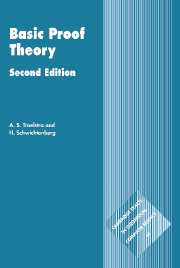Book contents
- Frontmatter
- Contents
- Preface
- 1 Introduction
- 2 N-systems and H-systems
- 3 Gentzen systems
- 4 Cut elimination with applications
- 5 Bounds and permutations
- 6 Normalization for natural deduction
- 7 Resolution
- 8 Categorical logic
- 9 Modal and linear logic
- 10 Proof theory of arithmetic
- 11 Second-order logic
- Solutions to selected exercises
- Bibliography
- Symbols and notations
- Index
8 - Categorical logic
Published online by Cambridge University Press: 05 June 2012
- Frontmatter
- Contents
- Preface
- 1 Introduction
- 2 N-systems and H-systems
- 3 Gentzen systems
- 4 Cut elimination with applications
- 5 Bounds and permutations
- 6 Normalization for natural deduction
- 7 Resolution
- 8 Categorical logic
- 9 Modal and linear logic
- 10 Proof theory of arithmetic
- 11 Second-order logic
- Solutions to selected exercises
- Bibliography
- Symbols and notations
- Index
Summary
For this chapter preliminary knowledge of some basic notions of category theory (as may be found, for example, in Mac Lane [1971], Blyth [1986], McLarty [1992], Poigné [1992]) will facilitate understanding, but is not necessary, since our treatment is self-contained. Familiarity with chapter 6 is assumed.
In this chapter we introduce another type of formal system, inspired by notions from category theory. The proofs in formalisms of this type may be denoted by terms; the introduction of a suitable equivalence relation between these terms makes it possible to interpret them as arrows in a suitable category.
In particular, we shall consider a system for minimal →∧⊤-logic connected with a special cartesian closed category, namely the free cartesian closed category over a countable discrete graph, to be denoted by CCC(PV). In this category we have a decision problem: when are two arrows from A to B the same?
This problem will be solved by establishing a correspondence between the arrows of CCC(PV) and the terms of the extensional typed lambda calculus. For this calculus we can prove strong normalization, and the decision problem is thereby reduced to computing and comparing normal forms of terms of the lambda calculus.
Another interesting application of this correspondence will be a proof of a certain “coherence theorem” for CCC(PV). (A coherence theorem is a theorem of the form: “between two objects satisfying certain conditions there is at most one arrow”.)
- Type
- Chapter
- Information
- Basic Proof Theory , pp. 258 - 282Publisher: Cambridge University PressPrint publication year: 2000



